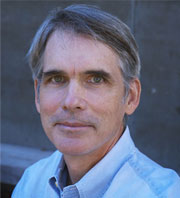Election 2008
City Voter, Country Voter
Desiree Cooper
Michael May
FEBRUARY 9, 2008
- Bill Bishop
- (Bill Bishop)
- Enlarge This Image
Web Resources
Related Stories
- Sober Up and Fly Right
- Fighting to Throw the Race
- Mike Gravel, Still in the Running
- Voting Rights: Release or Restrict?
More From Desiree Cooper
More From Michael May
Desiree Cooper: We've heard about how voters divide along race and class when they enter the voting booth. But it also matters where voters live. And we're not talking about the North South divide. Across the country, voters in rural areas are voting differently then their urban counterparts. That holds true across the country, and could have significant consequences for how the election plays out over the coming months. Bill Bishop is the editor of an online magazine devoted to rural issues called "The Daily Yonder." He's done a breakdown of how rural America voted on super Tuesday.
Bill Bishop: Of course, Mike Huckabee did real well in the rural south, and in rural areas generally. He essentially tied nationally with John McCain. And on the Democratic side, Senator Obama did much better in urban areas than Senator Clinton, and Senator Clinton pulled better in rural and exurban communities.
So did these results surprise you?
It just plays against type. Senator Obama is supposed to be the post-partisan candidate, but he pulls best in the bluest of blue communities. And Senator Clinton, who is supposed to be the divisive candidate from way back in the 1990s, did better in the redder, purplish counties of rural America.
So what do you think accounts for that?
We always talk about issues. Well, issues shmissues! That doesn't have anything to do with it. The way people join a party is like choosing between cocktail parties. You look in the door and scan the people, and see if they look like you. And if they look like you, then you go join the party.
You can really see that in the chord Obama strikes in young urban people. And Clinton, she goes to a different cocktail party within the Democratic party. And those people look different, act different. It's a split within the party, that's also a geographic split within the United States.
And like you said, that's counterintiutive, even to the vibe of their campaigns.
Right. And it depends on what you think happens in the fall, as to whether this is important or not. Is this next election all about bringing out the base, as it was in 2004, especially on the Republican side? If so, then it seems that Senator Obama can really bring out that core base.
Or is it about reaching into those middle areas, to the few people that are still independent? If you look at it that way, and I know this is the way the Clinton people look at it, they say that she is better at reaching out and getting those people who don't live in strongly Democratic areas.
And how is this playing out on the Republican side?
I think the Republicans would say, "Look, we've been losing those inner suburbs of cities, because we have scared off the people that live there with some really strong socially-conservative speech and platforms. And what McCain allows us to do is get back into those cities, where there are a heck of a lot of votes."
Bill, I want to thank you for joining us.
Thank you.
-
- Music Bridge:
- Einhangen und positiver
- Artist: Couch
- CD: Figur 5 (Morr)







Comments
Comment | Refresh
Post a Comment: Please be civil, brief and relevant.
Email addresses are never displayed, but they are required to confirm your comments. All comments are moderated. Weekend America reserves the right to edit any comments on this site and to read them on the air if they are extra-interesting. Please read the Comment Guidelines before posting.
You must be 13 or over to submit information to American Public Media. The information entered into this form will not be used to send unsolicited email and will not be sold to a third party. For more information see Terms and Conditions and Privacy Policy.